Resource Guide
In late spring 2020, amidst the global COVID-19 pandemic, people across the world gathered in large and small demonstrations to protest the murder of George Floyd and draw attention to the ongoing systemic issue of police violence. The protests calling for justice give voice to trauma and justified anger in Black communities terrorized by centuries of police violence and anti-Black racism.
The Wallingford Public Library stands with our fellow library workers, neighbors, and family members in the Black community. We stand against racism. We stand for inclusion.
If you are interested in working for racial justice and equity, these resources are a great place to start! Please note that this is not a definitive list. A resource list for children and families is also available through the Children’s Department.
Anti-Racism: Anti-racism is “the work of actively opposing racism by advocating for changes in political, economic, and social life. Anti-racism tends to be an individualized approach, and set up in opposition to individual racist behaviors and impacts.” (National Education Association - Racial Justice in Education)
BIPOC: “Black, Indigenous, and People of Color. The term BIPOC is used to highlight the unique relationship to whiteness that Indigenous and Black (African Americans) people have, which shapes the experiences of and relationship to white supremacy for all people of color within a U.S. context.” (BIPOC Project) We use the term BIPOC in this resource to identify opportunities that are not specifically for Black people, but Black, Indigenous, and People of Color.
Black Lives Matter: #BlackLivesMatter was founded in 2013 in response to the acquittal of Trayvon Martin’s murderer. Black Lives Matter Foundation, Inc is a global organization in the US, UK, and Canada, whose mission is to eradicate white supremacy and build local power to intervene in violence inflicted on Black communities by the state and vigilantes. By combating and countering acts of violence, creating space for Black imagination and innovation, and centering Black joy, they are winning immediate improvements in their lives. (Black Lives Matter)
Racial Justice: “The systematic fair treatment of people of all races, resulting in equitable opportunities and outcomes for all. Racial justice— or racial equity—goes beyond “anti-racism.” It is not just the absence of discrimination and inequities, but also the presence of deliberate systems and supports to achieve and sustain racial equity through proactive and preventative measures.” (Race Forward)
White Supremacy: White supremacy is “the belief system that rationalizes and reproduces white advantage in the political, social, and cultural institutions of society. This belief system holds that white people, white culture, and things associated with whiteness are superior to those of other racial groups.” (Teaching for Diversity and Social Justice, page 138)
Courtesy of the American Library Association, 2020
Talking About Race
National Museum of African American History & Culture
nmaahc.si.edu/learn/talking-about-race
An in-depth and accessible resource for all ages and audiences.
Scaffolded Anti-Racist Resources (updates regularly)
A comprehensive guide for determining which resources are best for where you are in your anti-racism journey. Includes books, podcasts, and social media accounts as well as resources for those who identify as Christian, Muslim, Jewish, and Buddhist.
White Privilege: Unpacking the Invisible Knapsack
An essay written by American feminist scholar Peggy McIntosh. It covers 50 examples, or hidden benefits, from McIntosh’s perspective, of the privilege white people experience in everyday life.
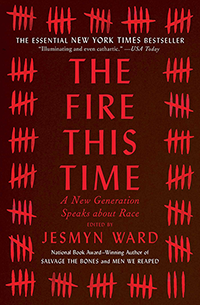
The Fire This Time: A New Generation Speaks about Race by Jesmyn Ward
In this bestselling, widely lauded collection, Jesmyn Ward gathers our most original thinkers and writers to speak on contemporary racism and race, including Carol Anderson, Jericho Brown, Edwidge Danticat, Kevin Young, Claudia Rankine, and Honoree Jeffers. “An absolutely indispensable anthology” (Booklist, starred review), The Fire This Time shines a light on the darkest corners of our history, wrestles with our current predicament, and imagines a better future.
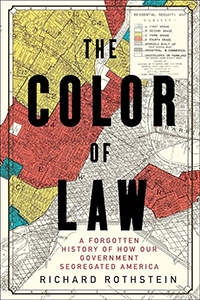
The Color of Law: A Forgotten History of How Our Government Segregated America by Richard Rothstein
Exploding the myth of de facto segregation arising from private prejudice or the unintended consequences of economic forces, Rothstein describes how the American government systematically imposed residential segregation: with undisguised racial zoning; public housing that purposefully segregated previously mixed communities; subsidies for builders to create whites-only suburbs; tax exemptions for institutions that enforced segregation; and support for violent resistance to African Americans in white neighborhoods.
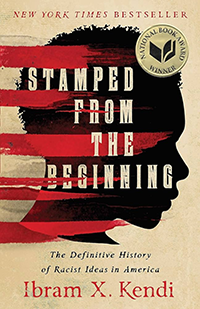
Stamped from the Beginning: The Definitive History of Racist Ideas in America by Ibram X. Kendi
As Kendi provocatively illustrates, racist thinking did not arise from ignorance or hatred. Racist ideas were created and popularized in an effort to defend deeply entrenched discriminatory policies and to rationalize the nation’s racial inequities in everything from wealth to health. While racist ideas are easily produced and easily consumed, they can also be discredited. In shedding much–needed light on the murky history of racist ideas, Stamped from the Beginning offers tools to expose them—and in the process, reason to hope.
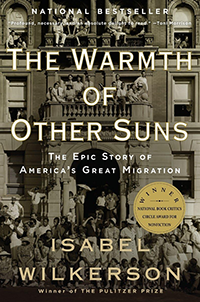
The Warmth of Other Suns: The Epic Story of America’s Great Migration by Isabel Wilkerson
In this epic, beautifully written masterwork, Pulitzer Prize–winning author Isabel Wilkerson chronicles one of the great untold stories of American history: the decades-long migration of black citizens who fled the South for northern and western cities, in search of a better life.

Why Are All the Black Kids Sitting Together in the Cafeteria? by Beverly Tatum
Walk into any racially mixed high school and you will see Black, White, and Latino youth clustered in their own groups. Is this self-segregation a problem to address or a coping strategy? Beverly Daniel Tatum, a renowned authority on the psychology of racism, argues that straight talk about our racial identities is essential if we are serious about enabling communication across racial and ethnic divides.
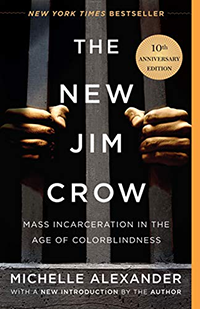
The New Jim Crow: Mass Incarceration in the Age of Colorblindness by Michelle Alexander
In this incisive critique, former litigator-turned-legal-scholar Michelle Alexander provocatively argues that we have not ended racial caste in America: we have simply redesigned it. Alexander shows that, by targeting black men and decimating communities of color, the U.S. criminal justice system functions as a contemporary system of racial control, even as it formally adheres to the principle of color blindness. The New Jim Crow challenges the civil rights community--and all of us--to place mass incarceration at the forefront of a new movement for racial justice in America.

A Colony in a Nation by Chris Hayes
Drawing on wide-ranging historical, social, and political analysis, as well as deeply personal experiences with law enforcement, Hayes contends that our country has fractured in two: the Colony and the Nation. In the Nation, the law is venerated. In the Colony, fear and order undermine civil rights. With great empathy, Hayes seeks to understand this systemic divide, examining its ties to racial inequality, the omnipresent threat of guns, and the dangerous and unfortunate results of choices made by fear.
How to Be an Anti-Racist
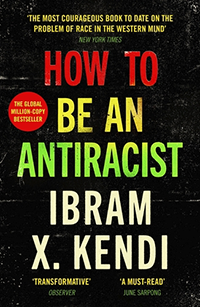
How to Be an AntiRacist by Ibram X. Kendi
Ibram X. Kendi’s concept of antiracism reenergizes and reshapes the conversation about racial justice in America--but even more fundamentally, points us toward liberating new ways of thinking about ourselves and each other. Instead of working with the policies and system we have in place, Kendi asks us to think about what an antiracist society might look like, and how we can play an active role in building it.
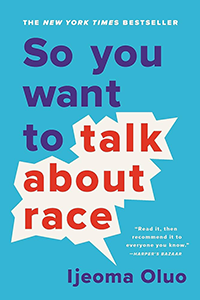
So You Want to Talk About Race by Ijeoma Oluo
Ijeoma Oluo offers a contemporary, accessible take on the racial landscape in America, addressing head-on such issues as privilege, police brutality, intersectionality, micro-aggressions, the Black Lives Matter movement, and the “N” word. Perfectly positioned to bridge the gap between people of color and white Americans struggling with race complexities, Oluo answers the questions readers don’t dare ask, and explains the concepts that continue to elude everyday Americans.
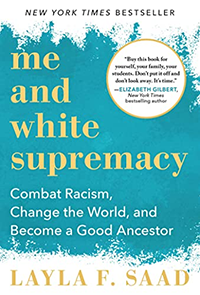
Me and White Supremacy: Combat Racism, Change the World, and Become a Good Ancestor by Layla F. Saad
Me and White Supremacy teaches readers how to dismantle the privilege within themselves so that they can stop (often unconsciously) inflicting damage on people of colour, and in turn, help other white people do better, too.
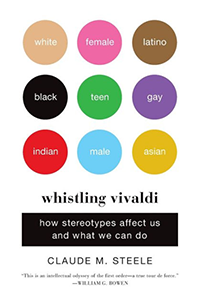
Whistling Vivaldi: How Stereotypes Affect Us and What We Can Do by Claude M. Steele
Claude M. Steele, who has been called “one of the few great social psychologists,” offers a vivid first-person account of the research that supports his groundbreaking conclusions on stereotypes and identity. He sheds new light on American social phenomena from racial and gender gaps in test scores to the belief in the superior athletic prowess of black men, and lays out a plan for mitigating these “stereotype threats” and reshaping American identities.
Memoirs & Biographies
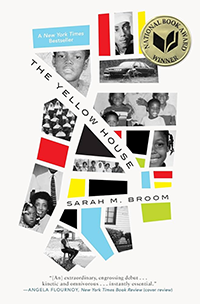
The Yellow House by Sarah M. Broom
The Yellow House is a brilliant memoir of place, class, race, the seeping rot of inequality, and the internalized shame that often follows. It is a transformative, deeply moving story from an unparalleled new voice of startling clarity, authority, and power.

The Autobiography of Malcolm X by Malcolm X, Alex Haley
Through a life of passion and struggle, Malcolm X became one of the most influential figures of the 20th Century. In this riveting account, he tells of his journey from a prison cell to Mecca, describing his transition from hoodlum to Muslim minister. Here, the man who called himself “the angriest Black man in America” relates how his conversion to true Islam helped him confront his rage and recognize the brotherhood of all mankind.
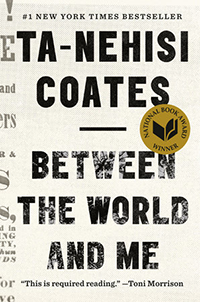
Between the World and Me by Ta-Nehisi Coates
In a profound work that pivots from the biggest questions about American history and ideals to the most intimate concerns of a father for his son, Ta-Nehisi Coates offers a powerful new framework for understanding our nation’s history and current crisis. Americans have built an empire on the idea of “race,” a falsehood that damages us all but falls most heavily on the bodies of black women and men—bodies exploited through slavery and segregation, and, today, threatened, locked up, and murdered out of all proportion. What is it like to inhabit a black body and find a way to live within it? And how can we all honestly reckon with this fraught history and free ourselves from its burden?
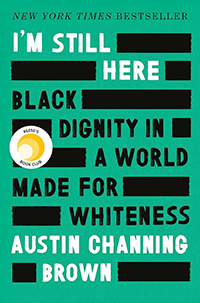
I’m Still Here: Black Dignity in a World Made for Whiteness by Austin Channing Brown
From a leading voice on racial justice, an eye-opening account of growing up Black, Christian, and female that exposes how white America’s love affair with “diversity” so often falls short of its ideals.

Born a Crime: Stories From a South African Childhood by Trevor Noah
Trevor Noah’s unlikely path from apartheid South Africa to the desk of The Daily Show began with a criminal act: his birth. Trevor was born to a white Swiss father and a black Xhosa mother at a time when such a union was punishable by five years in prison. Living proof of his parents’ indiscretion, Trevor was kept mostly indoors for the earliest years of his life, bound by the extreme and often absurd measures his mother took to hide him from a government that could, at any moment, steal him away. Finally liberated by the end of South Africa’s tyrannical white rule, Trevor and his mother set forth on a grand adventure, living openly and freely and embracing the opportunities won by a centuries-long struggle.
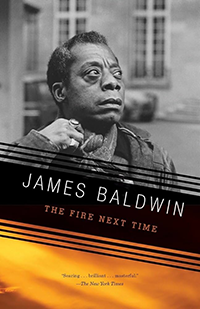
The Fire Next Time by James Baldwin
At once a powerful evocation of James Baldwin’s early life in Harlem and a disturbing examination of the consequences of racial injustice, the book is an intensely personal and provocative document. It consists of two “letters,” written on the occasion of the centennial of the Emancipation Proclamation, that exhort Americans, both black and white, to attack the terrible legacy of racism.
Fiction

Americanah by Chimamanda Ngozi Adichie
Ifemelu and Obinze are young and in love when they depart military-ruled Nigeria for the West. Beautiful, self-assured Ifemelu heads for America, where despite her academic success, she is forced to grapple with what it means to be black for the first time. Quiet, thoughtful Obinze had hoped to join her, but with post-9/11 America closed to him, he instead plunges into a dangerous, undocumented life in London. Fifteen years later, they reunite in a newly democratic Nigeria, and reignite their passion—for each other and for their homeland.

Beloved by Toni Morrison
Sethe was born a slave and escaped to Ohio, but eighteen years later she is still not free. She has borne the unthinkable and not gone mad, yet she is still held captive by memories of Sweet Home, the beautiful farm where so many hideous things happened. Meanwhile Sethe’s house has long been troubled by the angry, destructive ghost of her baby, who died nameless and whose tombstone is engraved with a single word: Beloved. Sethe works at beating back the past, but it makes itself heard and felt incessantly in her memory and in the lives of those around her. When a mysterious teenage girl arrives, calling herself Beloved, Sethe’s terrible secret explodes into the present. An American Classic.

The Bluest Eye by Toni Morrison
The story of black, eleven-year-old Pecola Breedlove. Pecola prays for her eyes to turn blue so that she will be as beautiful and beloved as all the blond, blue-eyed children in America. In the autumn of 1941, the year the marigolds in the Breedloves’ garden do not bloom. Pecola’s life does change- in painful, devastating ways. An American Classic.
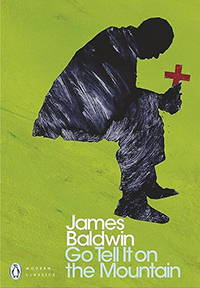
Go Tell It on the Mountain by James Baldwin
With lyrical precision, psychological directness, resonating symbolic power, and a rage that is at once unrelenting and compassionate, Baldwin chronicles a fourteen-year-old boy’s discovery of the terms of his identity as the stepson of the minister of a storefront Pentecostal church in Harlem one Saturday in March of 1935. An American Classic.

Homegoing by Yaa Gyasi
Two half-sisters, Effia and Esi, are born into different villages in eighteenth-century Ghana. Effia is married off to an Englishman and lives in comfort in the palatial rooms of Cape Coast Castle. Unbeknownst to Effia, her sister, Esi, is imprisoned beneath her in the castle’s dungeons, sold with thousands of others into the Gold Coast’s booming slave trade, and shipped off to America, where her children and grandchildren will be raised in slavery. One thread of Homegoing follows Effia’s descendants through centuries of warfare in Ghana, as the Fante and Asante nations wrestle with the slave trade and British colonization. The other thread follows Esi and her children into America. From the plantations of the South to the Civil War and the Great Migration, from the coal mines of Pratt City, Alabama, to the jazz clubs and dope houses of twentiethcentury Harlem, right up through the present day, Homegoing makes history visceral, and captures, with singular and stunning immediacy, how the memory of captivity came to be inscribed in the soul of a nation.

The Nickel Boys by Colson Whitehead
Set in the 1960s, the novel follows Elwood Curtis, a studious African American from Tallahassee with a sense of justice, who is adjudicated delinquent and sent to Nickel Academy, a juvenile reformatory in Eleanor, Florida, after riding in a stolen vehicle to attend university classes. He befriends Jack Turner, who goes by his family name and who has a less optimistic viewpoint. Elwood attempts to serve his time without incident, but is seriously beaten on two occasions, once for intervening to help a boy being attacked by sexual predators and once after writing a letter complaining of poor conditions. The tension between Elwood’s ideals and Turner’s skepticism leads to a decision with repercussions that will echo down the decades. Formed in the crucible of the evils Jim Crow wrought, the boys’ fates will be determined by what they endured at the Nickel Academy.

Underground Railroad by Colson Whitehead
This alternate history novel tells the story of Cora and Caesar, two slaves in the southeastern United States during the 19th century, who make a bid for freedom from their Georgia plantations by following the Underground Railroad, which the novel depicts as primarily a rail transport system in addition to a series of safe houses and secret routes.
For Teens
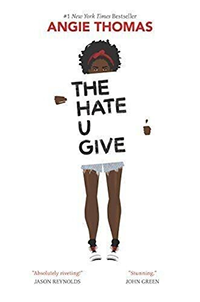
The Hate U Give by Angie Thomas
Sixteen-year-old Starr Carter moves between two worlds: the poor neighborhood where she lives and the fancy suburban prep school she attends. The uneasy balance between these worlds is shattered when Starr witnesses the fatal shooting of her childhood best friend Khalil at the hands of a police officer. Khalil was unarmed. Soon afterward, his death is a national headline. Some are calling him a thug, maybe even a drug dealer and a gangbanger. Protesters are taking to the streets in Khalil’s name. Some cops and the local drug lord try to intimidate Starr and her family. What everyone wants to know is: what really went down that night? And the only person alive who can answer that is Starr. But what Starr does—or does not—say could upend her community. It could also endanger her life.

Dear Martin by Nic Stone
Justyce McAllister is top of his class and set for the Ivy League—but none of that matters to the police officer who just put him in handcuffs. And despite leaving his rough neighborhood behind, he can’t escape the scorn of his former peers or the ridicule of his new classmates. Justyce looks to the teachings of Dr. Martin Luther King Jr. for answers. But do they hold up anymore? He starts a journal to Dr. King to find out. Then comes the day Justyce goes driving with his best friend, Manny, windows rolled down, music turned up—way up, sparking the fury of a white off-duty cop beside them. Words fly. Shots are fired. Justyce and Manny are caught in the crosshairs. In the media fallout, it’s Justyce who is under attack.
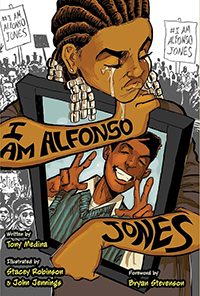
I Am Alfonso Jones by Tony Medina
Alfonso Jones can’t wait to play the role of Hamlet in his school’s hip-hop rendition of the classic Shakespearean play. He also wants to let his best friend, Danetta, know how he really feels about her. But as he is buying his first suit, an off-duty police officer mistakes a clothes hanger for a gun, and he shoots Alfonso. When Alfonso wakes up in the afterlife, he’s on a ghost train guided by well-known victims of police shootings, who teach him what he needs to know about this subterranean spiritual world. Meanwhile, Alfonso’s family and friends struggle with their grief and seek justice for Alfonso in the streets. As they confront their new realities, both Alfonso and those he loves realize the work that lies ahead in the fight for justice.
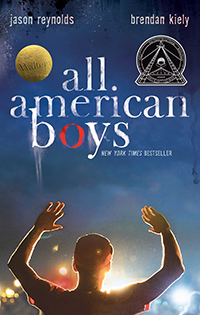
All American Boys by Jason Reynolds
In an unforgettable new novel from award-winning authors Jason Reynolds and Brendan Kiely, two teens—one black, one white—grapple with the repercussions of a single violent act that leaves their school, their community, and, ultimately, the country bitterly divided by racial tension.
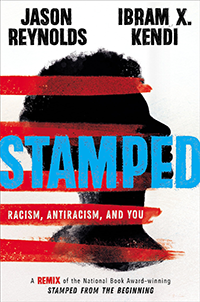
Stamped: Racism, Antiracism, and You by Jason Reynolds & Ibram X. Kendi
The construct of race has always been used to gain and keep power, to create dynamics that separate and silence. This remarkable reimagining of Dr. Ibram X. Kendi’s National Book Award-winning Stamped from the Beginning reveals the history of racist ideas in America, and inspires hope for an antiracist future. It takes you on a race journey from then to now, shows you why we feel how we feel, and why the poison of racism lingers. It also proves that while racist ideas have always been easy to fabricate and distribute, they can also be discredited. Through a gripping, fastpaced, and energizing narrative written by beloved award-winner Jason Reynolds, this book shines a light on the many insidious forms of racist ideas--and on ways readers can identify and stamp out racist thoughts in their daily lives.
United Way of Meriden and Wallingford
Holding weekly conversations about race, open to the public. Wednesdays at 12:00 PM
Meriden/Wallingford NAACP
Our local chapter of the National Association for the Advancement of Colored People.
Contact: Kim Fisher
Spanish Community of Wallingford (SCOW)
Respond to the needs of the Latino Community by assisting them to succeed in U.S. society and to enable Latinos to maintain and share their rich varied cultures with the broader community. (203) 265-9714
The Prosperity Foundation
Provides grants and funding to organizations serving to benefit Connecticut’s black community.